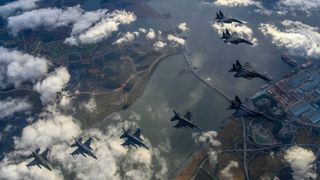The war in Gaza may seem to be yet another eruption of Middle East violence — a human tragedy on the other side of the world that captures headlines but ultimately has little impact on the security of the Korean peninsula. However, one does not have to search far to see that Hamas’ brutal surprise attack on Israel points to menacing geopolitical trends that could very much affect the security of the Korean peninsula if unchecked.
The first thing is to recognise is that this was not a spontaneous uprising by disaffected Palestinians in the Gaza Strip. The Netanyahu government had been receiving deserved criticism for incorporating intolerant extremists in its cabinet, embroiling Israeli society and the Israel Defense Force in divisive a constitutional debate, and overly politicising the critical US-Israel relationship. None of this mattered to Hamas, though, since that organisation is dedicated to the destruction of Israel regardless of the country’s policies or leadership. Nor do the shortcomings of the Israeli Government even remotely justify the genocidal targeting of civilian men, women and children for torture, rape, murder, and mutilation. Israel has a right under international law to defend itself and a moral duty to its people to destroy Hamas’ capacity to repeat such atrocities.
There is strong evidence that this war was instigated with support from Iran and that matters to the security of the international system more broadly. Tehran was watching Israel move towards improved relations and diplomatic normalization with Saudi Arabia and moderate Gulf States in a realignment of the Middle East that would have isolated Iranian influence and undercut the regime’s own commitment to the destruction of Israel and “death to America.” It is likely that the criminality of Hamas’ attacks was very much intended to provoke an Israeli military response that would upset the Arab world and derail diplomacy between Israel and many of her neighbours.
This geopolitical dimension should concern Koreans. Korean strategy depends on a stable and rules-based international order, but that order is being eroded in different ways by Russia’s war on Ukraine in Eastern Europe, China’s grey zone coercion in Asia, and Iran’s proxy violence through Hezbollah and Hamas in the broader Middle East. Iran and North Korea are in different categories from China since North Korea and Iran will resort to more extreme provocations and risk war to challenge the status quo. North Korea and Iran each stand to benefit when the other engages in provocations of this kind (which is not true of China). That explains why Tehran and Pyongyang are incentivised to reinforce each other’s asymmetrical capabilities if they can do it without putting themselves at risk of attack. Thus, North Korea in 2007 was caught providing Yongbyong-type reactor capabilities to Syria and has been caught today providing S-7 rocket propelled grenades to Hamas which were used against Israel (Pyongyang denies this but the video images are damning).
Korean strategy depends on a stable and rules-based international order, but that order is being eroded in different ways by Russia’s war on Ukraine in Eastern Europe, China’s grey zone coercion in Asia, and Iran’s proxy violence through Hezbollah and Hamas in the broader Middle East.
What can Seoul do? As a major importer of oil from the Middle East, Korea will want to maintain good diplomatic relations with the Arab world — but given the motivations and connections of Iran and Hamas to North Korea, Seoul should also want Israel to succeed in destroying Hamas’ ability to do this again. This is not the time for Korean diplomacy to go it alone — it will be critical to maintain solidarity with the other democratic advanced economies, beginning with the United States but including Europe, Australia, and Japan. That coalition of countries will stand by Israel, but also quietly urge Israel to use judicious restraint where necessary to maintain as much international support as possible and to ensure the deterrent signals to Iran are clear. The Yoon government needs to be at that table — even if it is behind closed doors — to shape an international strategy that defeats Hamas, deters Iran, and restores the longer-term possibilities for peace in the Middle East and the Korean peninsula.






